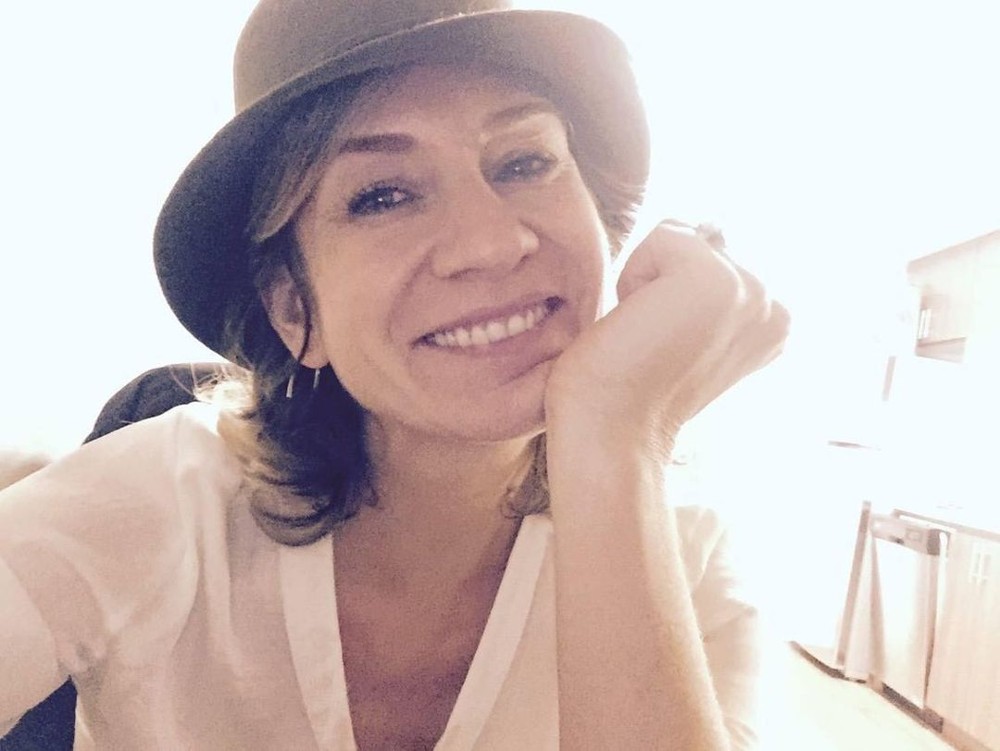If you’re a fan of the Coen Brothers’ multitude of movies, you’re likely to be intimately familiar with the music of Carter Burwell, who has been scoring the brothers’ movies going right back to their 1984 debut, Blood Simple.
Most recently, Burwell provided the ominous and haunting score for Joel Coen’s The Tragedy of Macbeth, which stars Denzel Washington as the title character and (Joel’s own wife) Frances McDormand as his plotting wife, Lady Macbeth. It’s a beautifully-realized film with cinematography by Bruno Delbonnel providing Coen with some of the most gorgeous black and white images you’re likely to see on screen this year, but Burwell’s score contributes something just as important sonically to the Shakespearean words being uttered by Coen’s fantastic cast.
On the flip side of that, Burwell scored the first two seasons of Apple’s Emmy-winning series, The Morning Show, starring Reese Witherspoon and Jennifer Aniston, a show that works hard not to be classified as just comedy or drama but finds a way to blend them both. Much of that is helped by Burwell’s music, which has been able to straddle tonal extremes in many of the Coen Brothers’ greatest films, such as No Country for Old Men and Fargo.
Burwell’s vast body of work has led to two Oscar nominations, oddly neither of them for work he did with the Coens. The first was his score for Todd Haynes’ Carol in 2016, and two years later, Burwell was nominated once again for Martin McDonagh’s Three Billboards Outside Ebbing, Missouri. Burwell also received an Emmy for scoring Haynes’ limited series, Mildred Pierce, in 2011.
A few weeks back, Below the Line got on Zoom with Mr. Burwell for the following conversation, where we discussed not only his long-running musical relationship with both Coen Brothers, but also his foray into episodic television with The Morning Show.
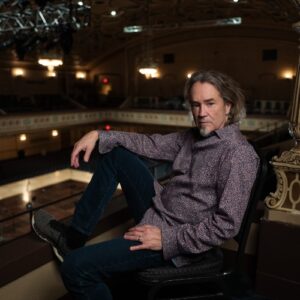
Below the Line: To start, I’d love to know what your first meeting was with the Coens before you scored Blood Simple, which was your first film score.
Carter Burwell: The way that happened was that I knew Skip Lievsay, who is still their sound designer and mixer, but I knew him through the rock music scene in New York. He knew bands that I was in. He knew members of those bands, including myself, and we all had different day jobs. At that time, I was an animator, for instance, and I knew that Skip had something to do with sound in TV and movies, but I didn’t know what, honestly. He called me and said, “I’m working on a film by some people our age, their first film, independent film, and they need music.” He thought that the music he had heard me play at these clubs was the kind of thing that might be appropriate. He was just sort of feeling me out if this was something that would be interesting. At that time, and sort of still, to some extent, if someone asked me, if I’m interested in doing something I’ve never done before, I tend to say yes, sure, why not. So I went and met Joel and Ethan in their cutting room and saw a couple of reels of a rough, very early cut of Blood Simple. I didn’t have anything really to play for them ‘cause I had never worked on a film. I went back and, over the course of a weekend, I put together some sketches of different things, some things that are more traditional thriller, suspense music, and other things that weren’t anything like that. I really didn’t hear anything from them for a month, and assumed that wasn’t happening. I was doing other things. I think I was in Manchester, England recording a record when they called and said, “We do want you to do our movie.” I guess what happened is that the people backing Blood Simple, they really wanted them to hire someone who knew what they were doing. And that was definitely not me. It was Joel and Ethan’s first film, and to the extent possible, the people who were backing the film, wanted them to hire people who DID know what they were doing. Anyway, they eventually decided that they liked these themes that I had done, and they asked when I was coming back to the States. Basically, I came back and we just recorded the same themes that I’d given them from that first couple of days after I’d seen a couple reels.
BTL: And back in those days, you probably just handed them a cassette, because there were no files or even CDs at that point.
Burwell: You’re absolutely correct. It would have been a cassette. There’s no question about that, and honestly, I don’t think any of us know exactly how to synchronize music to picture while I was recording it. When we did actually record it, I think Joel would say, “I think we need a minute and 40 seconds,” and I’d put a stopwatch on the piano or that kind of thing. We really didn’t know exactly what we were doing, and Ethan also was very… there was no money, so I was being paid with deferred payments, and Ethan’s very honest. “The odds are this movie will never come out, and you’ll never get your deferred payments, just being clear about that.” They are very honest, forthright people, and the first couple of films I did with them, when I finally started working in Hollywood, that level of honesty and candor is not the standard thing in the industry.
BTL: What was your main axe when you were playing in bands?
Burwell: Keyboards, mainly synthesizer. I had a giant Yamaha analog synth-like lugged around New York back then.
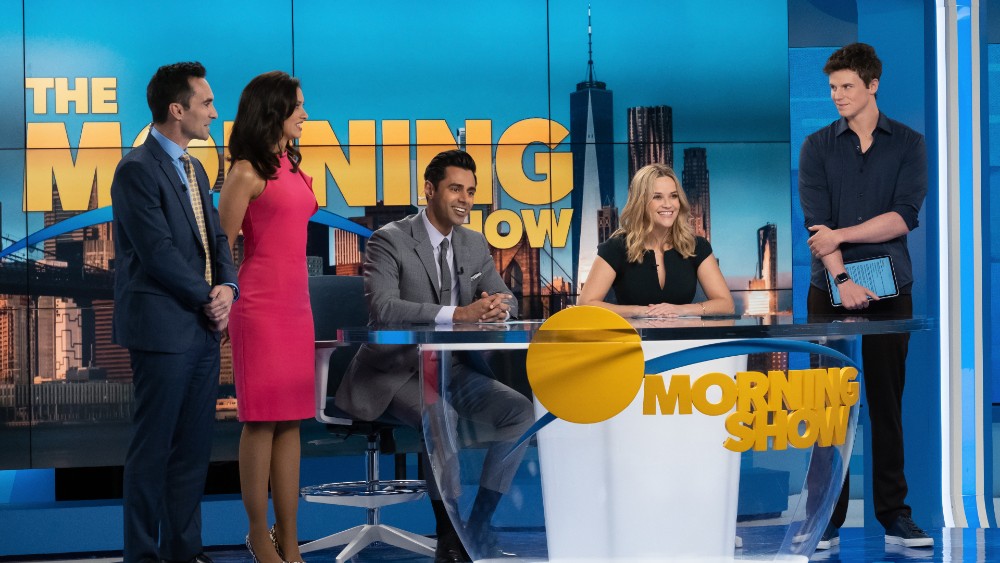
BTL: You have two really interesting projects right now with The Tragedy of Macbeth with Joel, and The Morning Show, which you’ve done two seasons of. Let’s talk about Macbeth first, because you obviously have this long-standing relationship with Joel for so many years. At what point does he tell, I’m going to make a Macbeth movie next. When do you start thinking what kind of music you might write for such a movie?
Burwell: I think I heard rumors about the film before I ever actually heard it directly from Joel, but you know, if you look around right now, you’ll probably find rumors of whatever Joel and/or Ethan’s gonna do next. There are always these things floating around, because they have a lot of scripts out there. A rumor doesn’t really mean a film, so I had heard rumors about it, but it was better never to take those seriously until Joel did actually call me and this would have been in 2018 probably. Just before they went to shoot, he called me to tell me he was doing it and gave me a little bit of the one-sentence background which is that it’s a Shakespearean text, he’d adapted it. He sent me a script. That it’s black and white, doesn’t take place in Scotland, but it doesn’t take place anywhere else either. I think you’re saying that, because it just so happens that I love Scottish music, and I would really love to jump in on some Gaelic tunes, but he made very clear right away [that] it’s not Scottish – everyone speaks with their own accent. The actors are from all over. He just gave me that quick update, and I guess he gave me a rough schedule, because we usually talk about that, but that schedule, of course, quickly became meaningless, because they got shut down during production, during the lockdown.
BTL: You do get to read the script early, but do you still wait to see some actual footage before doing any writing? Or can you start thinking of some themes or ideas for later?
Burwell: I pretty much always do wait to see footage before I really write what you would call the score to the movie, but it’s true that during the months between when he mentions it and when I finally actually start working on it, I am sitting at the piano and if something comes along that under my fingers it seems like it might be applicable to Macbeth, I’ll make a note of that. But I don’t really make choices about the music until I see it. The reason is very simple. It’s just that there’s so many ways to shoot a script. I, of course, know Joel so well that I have a pretty good idea how he’s going to shoot, but then again, even with the script in hand, if you didn’t know the aspect ratio was like a 1:1.2 aspect ratio, just right there that tells you a lot about the film, even about how faces just fill the screen and the way the cinematography is done, the way the sets are done. Joel tried to describe the sets to me but until you actually see that, you have no idea what a theatrical and surreal environment these characters are living in.
BTL: From the script, can you at least understand the tone and that this is not a comedy, but will be a fairly serious version of Shakespeare’s text?
Burwell: It is Macbeth, although the other day, I looked up, just out of curiosity, on IMDb, how many Macbeth feature films have been made. There are about 40, so people have made them about every two or three years since film was invented, someone’s been making one, but one of them is called, “Macbeth: The Comedy.” [chuckles] So you’re right — anything is possible.
BTL: This also seems a little more minimalistic than we normally hear from you with their movies, so do you think that’s a fair statement?
Burwell: I’d say that’s true. In some ways, it harkens back to Blood Simple, strangely, that minimalism. It is, like Blood Simple, a thriller. Definitely one way of looking at it is two people plot a murder and then we follow the psychological ramifications of that murder on them. That’s classic thriller material, right? Postman Always Rings Twice or Double Indemnity. Blood Simple was a thriller and along similar lines so I think that it is somewhat minimal. I’ll be honest. Some of the music I wrote has been lowered down and the sound effects have taken over in some scenes. Of course, if you asked me, I’d rather have the music knob turned up, but that’s, in the end, really up to Joel and Skip. So yeah, it is minimal. There’s no question. Part of that comes out of this question. One of my first discussions with Joel is that their scripts — Joel and Ethan’s scripts — typically, you can read it and pretty much know where the music’s gonna go. There’ll be a page of just description with no dialogue, describing a montage or things like this. Shakespeare doesn’t work that way. There’s page after page of dense and beautiful language, and you need to hear it. Every one of those words is precious and important to understand. So I did say, “Well, where are we going to fit the music in?” Because also Joel, in his script, has also tightened the play up. It’s not like he’s opened it up with long passages where there’s no dialogue. If anything, he’s tightened it, so that it goes by even faster, like 108 minutes or something, the film and overlaying scenes and characters. Finally figuring out where to put the music was my first question to him, even before we shot it. We ended up with a general idea that the dialogue is the melody and the music is the accompaniment of the dialogue. That’s not always true, but a lot of the time, it’s true, and that accounts for the minimalism, I’m trying not to get in the way of this dialogue, which you have to understand, every word of it. To a 21st century audience, it takes extra effort to understand Shakespearean dialogue, so I really did have to stay out of the way, and that meant music did have to be minimal in terms of musical information. There can’t be a lot of melody going on. There can’t be a lot of complex instrumentation or anything that would distract you from the language.
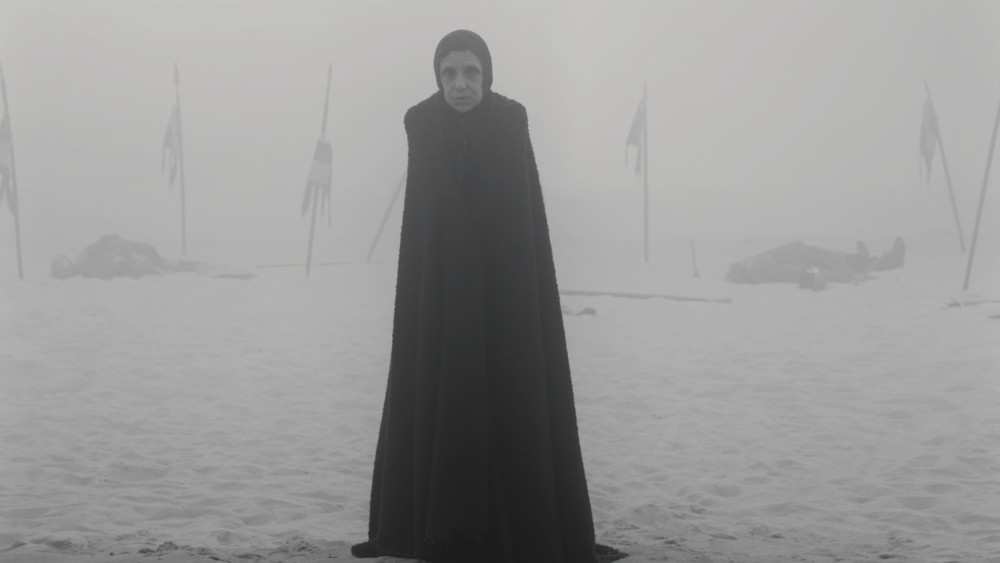
BTL: I did like the atmosphere you create with the orchestra and things like tubular bells, which you don’t hear often these days. Do you talk to the Coens or Joel about instrumentation as well, or do they generally leave that up to you?
Burwell: With Joel, I don’t really talk about instrumentation much. No, really not at all, but I did mention… I have to say we also were recording music during the pandemic, so I was trying to write just for strings, because the string players can wear masks. They still have to get tested and things like that, but it’s certainly simpler than working with woodwind or brass players, singers. All of those are very complicated. I tried to write it for strings, and I felt one of my first reactions on seeing the footage was to write for strings. This is more about me than anything else, but when I see beautiful black, white and gray cinematography like that with dark gray blood and all that tension, I think of Psycho and I think of Bernard Hermann’s score for strings. To me, strings just go with that look of that film. I see that silky gray and I think strings, but the concept was also going to be helpful with regard to recording during a pandemic. In the end, that didn’t totally work out, because it’s Macbeth. There are battle sequences, and I did hire six brass players and figuring out how to do that was complicated — like everything during a pandemic has been complicated. That’s where a lot of the instrumentation comes in, and of course, the percussion as you say — the bells and timpani — again, it is about soldiers and fate calling to them, so the bell and the banging and percussion all pretty much comes with the territory.
BTL: Do you generally write on piano and then go into the computer to arrange it and then go in with the orchestra and live musicians to record it? Is that your general process?
Burwell: That’s exactly what I do. I wouldn’t call myself a “pianist,” but as a composer, that is my instrument and that’s right. That’s how I approach it.
BTL: You’re never writing on the computer right away, but working off the computer first?
Burwell: I usually come up with themes at the piano. That’s most comfortable for me just because when I’m playing piano, it doesn’t seem like work. Once I turn on the computer, the clock is running, and I’m working. This one was a little different. A lot of it is dependent upon string, like trying to find different string colors, different sonorities, different ways of doing pizzicato and tremolo and all these string techniques, which I can’t really do on piano. I did develop it on piano, but it then still needed a great deal of development. As minimal as it is, it really does depend on timbre and texture. The strings are sometimes playing smoothly, but a lot of the times are playing more disturbingly. I had to figure that out — the celli will do this, the bass is gonna do this. I actually had a big bass section, because so much of the music is at the very lowest octave of the orchestra. I think we had three or four bass players — one’s doing pizzicato, a couple of them are doing other things. But that was really fun. It’s just not something you can really do at the piano.
BTL: It sounds like you were able to record all this stuff in person with you and musicians all in the same place, which is very different from so many other stories I’ve heard about the composer being in one country, the conductor in a second and the orchestra being in a third, and figuring out ways of syncing all of that up.
Burwell: No, that’s true. I hear the stories, too, and the Musicians Union, helpfully, developed their own scale for if someone’s going to just record in their own basement, how do you pay them? And people putting together scores from 30 separate musicians all in their own homes doing things. It’s great to see how resourceful people can be, but this, I’m very happy to say, we recorded everyone in a room. We had a big room at this ballroom called the Manhattan Center. It’s not a large ensemble, maybe 30 players, so we were able to spread them out very nicely, social distancing, string players all wearing masks. Then, when we brought in the brass, they were separate from the strings. We put them about 16 feet apart with screens between them. After they played, no one’s allowed in the room for four hours while they circulate the air. Because brass, it’s all about breath and spit and stuff like that, but I’m happy to say, yes, I was there conducting, and we did it all, almost as if it were normal, except that everyone’s being tested every day. Apple picked up the costs of all the COVID testing, which were considerable, but that’s the only way you can keep working right now, is to have that in place.
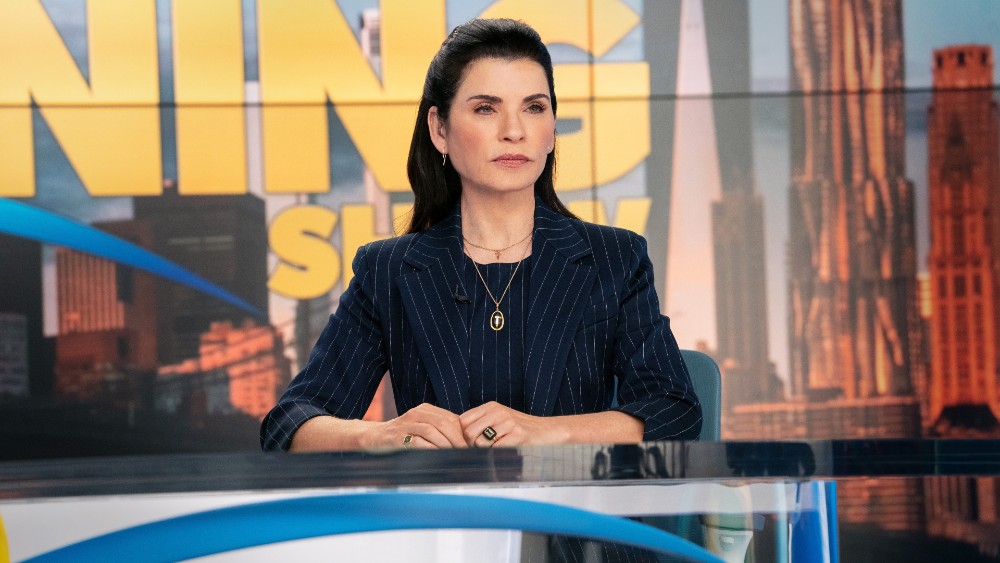
BTL: Let’s switch over to The Morning Show, which I will confess. I have not seen the entire second season, but I did listen to both soundtrack records. Although you previously scored limited series for Todd Haynes and Lisa Cholodenko, this and Space Force are episodic television, which is new to you. I’m not sure which came first.
Burwell: Around the same time, I think. It was 2019 that I first did both of them. I may have started The Morning Show at the end of ’18, I’m not sure. I have to say that I’m not a TV watcher, so it’s a medium that I don’t have any particular knowledge or understanding of, whereas you show me a film and I know usually right away what I think the music should be. Someone else could see it and have a different opinion, but I’ve always loved film since I was a kid, and I just love feature film. It’s a medium that I understand and I enjoy — it means a lot to me. Television, I don’t really totally understand, especially episodic television, where there’s no end. And that’s the biggest difference. To me, the biggest difference, no question, is there is no end.
Let me put it this way. Every once in a while, someone will say, “I’m working on a film, and I’ve got this scene, I don’t know what to do. Can I show you the scene and tell me what the music should be?” No, you can’t because I don’t know what the music should be unless I know where it’s going, what it’s supposed to do in the end, what the goal is. Without knowing your goal or where you want it to all come to at the end, I can’t have any opinion about it. Television is sort of like that. When I started any of these shows, I didn’t know what the last episode was going to be. I’m not sure they’d written it, but they certainly hadn’t given it to me — they kind of keep it secret sometimes. Without an end, it’s just very different. It seems to mostly be about setting tone, establishing something about these characters, and scoring the challenges, conflicts and epiphanies that occur during an episode.
Still, as a composer who works in film, I really want to know where I’m going, so I can create a structure that has an ending. Macbeth being a good example. That’s an arrow shooting in a direction the whole time, and it’s got to end where it ends.
I’m still getting used to it. I think I sort of have an idea now how that’s supposed to work, but Joel has a way of describing television, and the question I’m talking about, he says, “Film has a beginning and a middle and an end. Television has a beginning and a middle… and a middle… and a middle … and a middle … and eventually, it peters out.”
BTL: You’re then the opposite of most people working in television who mostly want their shows to be renewed for another season and for it to keep going.
Burwell: I love the people I’m working with on The Morning Show, and I’m happy to have another season. Working on it is very time-consuming, ’cause it goes very fast, and there are ten one-hour episodes, but in a way, it is enjoyable. I like the characters — they’re so flawed but we get comedy out of that and tragedy. I have to say I do enjoy it. It’s just still confusing to me, as a composer, how I’m supposed to approach it exactly.
BTL: Who brought you onto the show? Was it Jay Carson or whoever directed the pilot?
Burwell: Well, that’s a good question. I think Michael Ellenberg reached out to me. His production company is Media Res, and Mimi Leder is the person I mostly talked to on it, because she’s a film person. So we quickly kind of agreed — we speak the same language, she’s worked with film composers before — that she is 98% of the time the person I’m talking to. I also work with Kerry Ehrin, so it’s the three of them. I think it was Michael’s idea to bring me on. I did ask at a certain point, “Why me?” It just didn’t seem like a natural fit to me, but he and Mimi and Kerry all said that they felt there was comedy in the writing, but that there’s also so much other stuff, so much tragedy and people butting heads, that they needed help getting the comedy expressed. They didn’t want to express it in a jokey way. They wanted someone who could just find comedy in uncomfortable situations, and you could say that I do that. Mostly what I do is much darker than The Morning Show, but as I understand, that’s what they were looking for.
BTL: The Morning Show seems to allow you to play with different styles and instrumentation vs. a movie where you have to create an overall tone and sound to keep it cohesive where on TV, you can change things up from one episode to the next.
Burwell: There’s some of that. Still, the same way that a film is its own world, The Morning Show is its own world. We’re always gonna have upright bass. We’re always going to have piano, because just the look and the way it’s shot, that sort of very glossy, higher-end New York apartments. It’s just shot in a way that we realized very early on, “Geez, piano and upright bass really work. ” It’s partly also that the characters, they think of themselves as being sophisticated and know-it-alls. They’re not sophisticated or cool or anything, but the music, the sort of slightly jazzy quality of those instruments brings out that quality, so that’s not going to change too much. But you’re right, this season we had an episode that took place entirely in Italy, and I kind of wanted to try to do it all with Italian instruments just to get the most out of that unusual setting. And so you could also feel the characters as fish out of water in this other place.
BTL: With other filmmakers you’ve worked with, are you also getting a script fairly early but then waiting to see footage? Do any of these filmmakers ask you to write music in advance for them to cut to or things like that?
Burwell: No one’s ever really pushed for that. I mean, Martin [McDonagh] is doing a movie now where Brendan Gleeson plays a fiddler, and he plays on screen, so they needed some fiddle music for that. And so, there was an open question of, “Carter, do you want to write some fiddle music?” But as it so happens, Brendan Gleeson is himself in real life a fiddler, and he wanted to write his fiddle tune, so he did that. It very rarely does come up. There are directors who do ask for it, but I guess I’m not working with those directors, because I’m not sure really, almost never, does anyone ask that of me.
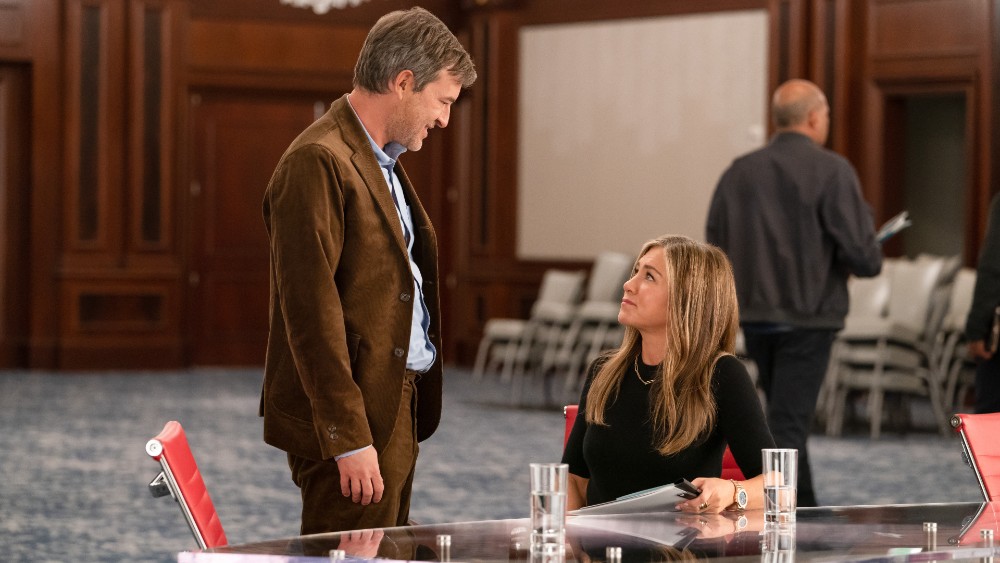
BTL: Do you have to deal with temp music at all or are you working with people at this point who don’t really put on temp music if they know you’re doing the score?
Burwell: Well, it’s a good question. With the Coens, I have, for a long time, asked that they not put in temp music and that has worked out, fortunately. There was no temp music in Macbeth, and we’ve managed to avoid it. I think sometimes if they have to have temp music for a screening or to show it to someone, they might put some into a scene or two, but then I ask them, “Please do not play it for me,” and not bring it in our discussions unless it’s something incredibly great or incredibly bad about it. I try to avoid it when I can. Todd, his editor, Fons [aka Affonso Gonçalves] often will put in temp music, he kind of does it while he’s cutting film. A lot of editors like to have a tempo there to cut to. It’s not an unusual thing for editors to want some music there, even if it doesn’t have anything to do with screenings. And then, if you do have screenings where they’re doing a marketing screening or screening it for executives or something like that, people typically do want some temp music, because no one wants to sit through a dry movie if they don’t have to. Yes, I’ve been lucky with Joel and Ethan, they don’t do it, Spike [Jonze] doesn’t do it. Todd, because his editor likes to do it, typically does. Martin doesn’t. I’m trying to remember on Three Billboards. A lot of these movies, fortunately, are so generous like Three Billboards being an example, that there is no temp music you can really put into that movie that plays all the aspects of it — the battle-hardened Fran McDormand character who’s also like really a sweetheart and a mom. But at the same time, throwing firebombs at the police station. What music is gonna play all of that? So I’m lucky that a lot of the movies I work on, they’d be almost impossible to temp anyway.
BTL: I expect when you have Fran on screen, you just want to let her take her own tempo.
Burwell: I agree. Actually, there’s at least one scene in Macbeth where I did score it for Fran, and we ended up just taking the music out. It was better just to hear every little nuance of her voice and breath and some groaning sound effects in the background and that kind of thing. So yeah, you’re right.
BTL: I spoke to Randall Poster recently, who is a music supervisor that was another bucket list interview for me. Can you talk about working with music supervisors, if you do? Who do the Coens usually use for that role on their movies?
Burwell: It’s not like there is a usual. If they have a movie that has a lot of songs in it, so that would go back to, say, Oh Brother, Where Art Thou? or The Big Lebowski. Both of those, right in the script, have lots of songs, and T Bone Burnett worked on both of those to some renown. If it’s just where there’s an occasional song, like Ballad of Buster Scruggs, they kind of came up with those ideas on their own. Like the song in Tim Nelson‘s part at the beginning, Gillian Welch wrote that for the movie with Dave Rawlings. That was Joel and Ethan’s idea to ask them to write a song there. The other things, like there are some songs in bars, saloon songs, I think Ethan kind of found most of those. Ethan is a musician, plays guitar and other things. They’re both aficionados of folk music, and especially old-timey folk music. They grew up with it, and Oh Brother, Where Art Thou? is an expression of their tastes in music. And so, they did that themselves and Ballad of Buster Scruggs, so there isn’t a person they go to, the way that Randy is for Todd. I think that’s a permanent connection there.
And the relationship between composer to music supervisor… how should I put it? … is vague. But in fact, we mostly never see them and don’t have much to do with them. I think if you’re a songwriter working on a film, you’re working with a music supervisor, but the composers, we’re really doing our own thing, and we’re interacting with the director. There’s no real reason to work with the music supervisor. Their job is almost more an executive level to me, maybe they have something to say about the budget, might discuss the budget with them, and that’s about it. But at the same time, I’d be the first to say that someone like Randy or Sue Jacobs — these are people I’ve worked with — and they’re just really good at what they do. I mean, they shape a lot of the musical voice of the films that they work on, there’s no question about it. It’s just maybe not the score. I certainly don’t mean to be belittling what they do, it just doesn’t have much to do with the score, when you get down to it.
Both seasons of The Morning Show can be watched on Apple TV+. The Tragedy of Macbeth will hit theaters on Christmas Day and then join The Morning Show on Apple TV+ starting Jan. 14, 2022. All pictures courtesy Apple, except where noted.




